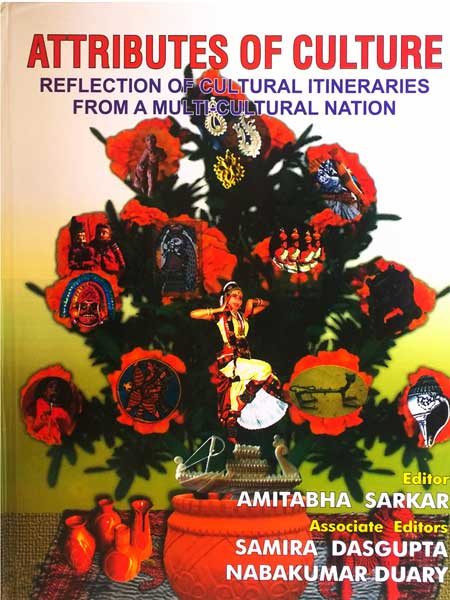
Attributes Of Culture,Reflection of Cultural Itineraries from a Multi-Cultural Nation
Amitabha Sarkar,samira dasgupta,nabhakumar duary
ISBN: 9789385161315, 9385161318
Sale Price: INR 3500.00
Discount: 30.00%
INR 2450.00 You Save: INR 1050.00
Title: Attributes Of Culture,Reflection of Cultural Itineraries from a Multi-Cultural Nation
Author: Amitabha Sarkar,samira dasgupta,nabhakumar duary
ISBN 13: 9789385161315
ISBN 10: 9385161318
Year: 2016
Language: English
Pages etc.: 355p., crown
Binding: Hardbound
Aayu Publications
India has a rich cultural heritage. Culture embodies the ideas and norms of a group. It is the sum-total of its ideal patterns and norms of behavior. Culture fulfills those ethical and social needs of the groups that are ends in themselves. Culture possesses an order and system. Art is a manifestation or expression of inner thought which is obviously a creative in nature. It is a kind of visual communication carrying the cognitive meaning of the object. This art form is either tangible or intangible which are a kind of cultural attributes of an ethnic group. In the present treatise we chiefly concentrate upon both tangible art forms which one can observe, can even touch the object/specimen and also, the intangible art which one can feel through his/her empathy like folklore, myth, riddle even the performing art forms etc. Often some tangible art form become a craft to a particular community through which they are identified, such as, bell metal works by Kansari, conch Shell work by Sankhari, painting on Pat by Patua and Dokra works by Gadwa community, Gayna bari, Dush avatar tash, Madhubani painting, puppetry, wood engraving, tattoo, basket weavers especially among Riang of Tripura etc. Among the intangible art forms, Kathak, Charan folk song, Pandawani, Toda myth etc. are the key attributes of our culture and our countrys heritage is enriched by these least known art forms.
Man learns his behavior from his immediate environment and this forms the basis and develops the traits of his culture. Thus culture is a system of learned behavior shared by and transmitted among the members of a group. Man begins to learn it since his birth. The present volume is an assembly of number of articles of various least known art forms of a multi-cultural nationIndia. This book can help students, NGOs, planners cum local administrators to gain an insight into local cultural milieu which in turn can help them adapt a holistic approach for developmental programmes at micro levels.
Dr. Amitabha Sarkar (Born: 1952) is a M.Sc., Ph.D (Science) in Anthropology from the University of Calcutta and Specialized in advanced Social-Cultural Anthropology. His remarkable empirical contribution in anthropological research arena is on impact of industrialization, tribal ethnography, culture ecology, ethno-science, religious belief system being integrative process and culture change, management of environment with traditional knowledge. He has published about 15 (fifteen) books and more than 100 (one hundred) research papers in reputed journals. He possesses 35 years research experience and carried out empirical study among tribal and weaker section of Rajasthan, Gujarat, Jharkhand, Chhattisgarh, Odisha and West Bengal. He is the life member of INCAA, Indian Science Congress Association and Indian Anthropological Society. He was associated with Anthropological Survey of India from 1977 to 2012.He is also consultant researcher and involve in generating empirical data from tribal area of Odisha. (Contact: AG-44. Salt lake, SectorI I, KOLKATA700091).
Dr. (Mrs.) Samira Desgupta (Born: 1953) is a M.Sc., Ph.D (Science) in Anthropology from the University of Calcutta. She has specialized in Cultural Anthropology and has noteworthy contributions are on culture ecology, role and status of tribal women in unorganized sector, tribal ethnography, ethno-science, religious belief system, traditional knowledge system among the tribals and cultural tourism etc. deserve for praise in academic arena being a perceptive researcher. She has published 12 (twelve) books and about 95 (ninety five) research papers in various reputed journals of the country. She possesses 35 years research experience and carried out intensive field work among various tribal communities and weaker section of Rajasthan, West Bengal, Chhattisgarh, Odisha and Jharkhand. She is a life member of INCAA, Indian Science Congress Association. She was associated with Anthropological Survey of India from 1977 to 2013 and carried out several research projects for AnSI where during XIth Plan Period she was involved with the study of Tangible & Intangible Cultural Heritage Traditional Knowledge System: Ethno Medicine. She is also involved as consultant researcher and devoted in generating empirical data from tribal area of Odisha. (Contact details: bhabbinimay@yahoo.com)
Dr. Nabakumar Duary (Born: 1965) received his M. Sc. and Ph.D degree in Anthropology with specialization in Social Cultural Anthropology. He is attached with the Anthropological Survey of India from 1992. Dr. Duary has published more than fifty research papers in edited books and academic journals as well as published two books. He has also made a significant contribution in the field offolk and tribal art and crafts, traditional knowledge, tribal education, folk and tribal culture in India. He has also a deep interest in the Visual documentation of the marginalized communities. Dr. Duary got training in Visual Anthropology from Satyajit Ray Film and Television Institute, Kolkata and jointly made four documentaries; Beniputul (glove puppet)- a documentary is an independent work among them.
We Accept Online Secure Payment
